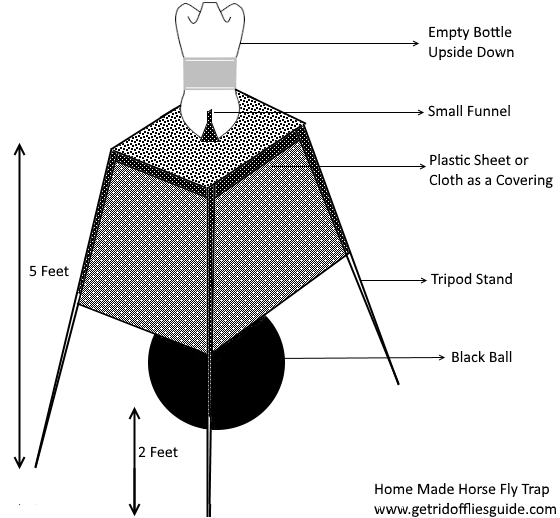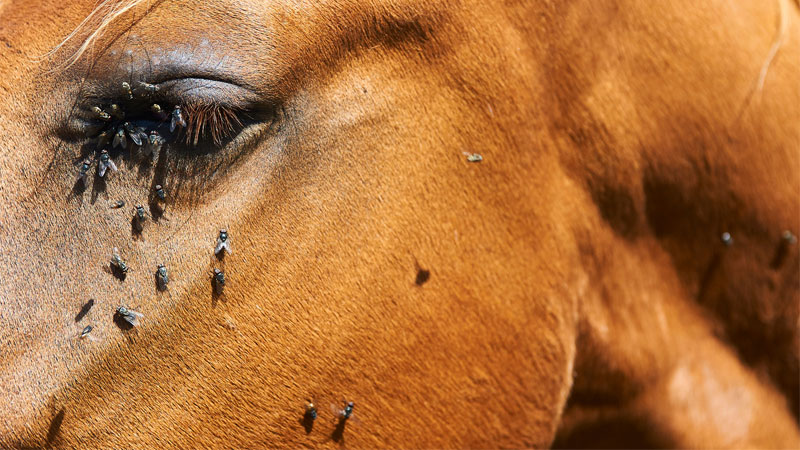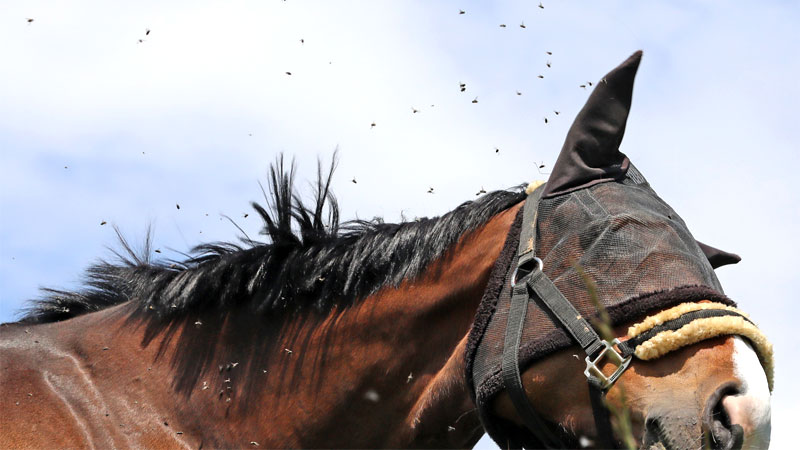Owning horses isn’t all fun and games. For example, you have to keep up with the dreaded horse fly, not to mention other fly species whose jobs seem to include bugging your equines.
Mild winter weather from March to October, especially in the Northwest, can contribute to a serious fly season. Other regions can have violent biting insect seasons which affect both horse and owner.
Unlike other wild animals, horses cannot escape from these insects and as they try to swish and stomp them, they consume a lot of energy. Fortunately, they (and you) can get some relief as we show you how to keep flies away from horses using nine excellent tactics.
1. Lights Off
Most insects such as biting midges, horse flies, deer flies, or face flies prefer a well-lit place. Simply stable the horses during hot days or at dusk and keep the lights off. This will provide some cooling shade while keeping horse flies away.
2. Fly Masks and Sheets
Using a fly mask is one of the most effective methods out there. While not the best way to keep flies off of horses completely, the mask protects their ears, jowls, and eyes.
Some of the best and most effective masks to use include open-weave, fly sheets, and mesh blankets. These will go a long way towards protecting your equine friend’s most sensitive areas from bites. You can also protect the legs of your horse using fly boots.
3. Air Circulation
Mosquitoes and biting midges are naturally poor flyers. A well-ventilated area with properly erected fans outside a stall helps with the movement of air. Not only will this keep the inhabitants cooler (thus discouraging sweat bees and similar pests), it will provide too much turbulence for these pesky flies to handle.
4. Bait and Fly Traps

One of the easiest ways to keep small flying insects away from the horses is by using sticky traps. You can hang fly paper ribbons, rolled sheets, and brightly colored sticky tubes in the barn. Just make sure they’re in a position where they cannot come into contact with birds, pets, and horsetails as they swish.
To get rid of horse flies and other large flies, you’ll want to invest in (or build) something similar to a Horse Pal fly trap. This is a large trap that attracts visual hunters such as horse flies and deer flies. They get trapped in the metal portion of the trap and soon cook to death.
Regardless of whether they have an attractant or not, bait and fly traps will work effectively in trapping adult flies. If you decide to use traps with attractant ingredients, remember to place them away from the barn and horses to prevent the pests and flies from being drawn into the barn.
Related: Best Fly Sprays For Horses
5. Dry Ground Grazing
Ensure that at the onset of the summer, you graze them on higher, drier pastures. This will prevent creating muddy areas which flies are naturally attracted to. Once the wet lower pastures dry out, you can have the horses graze there.
6. Get Predators to Help
These days, you can order almost any product with a click of a button, even live critters. Some companies sell fly parasites online, delivering them to you in a matter of days.
These parasites are actually wasps which lay eggs in the developing pupae of flies The larvae feed on their victims, reducing the overall fly population noticeably. The best thing about parasitic wasps is that they’re harmless to animals or humans.
7. Harrow Pastures and Collect Manure
The first step towards eliminating mosquitoes and flies is by doing away with their breeding grounds completely. That being the case, you can keep flies away from your horses by gathering manure in paddocks and drag the pasture from time to time to break the manure piles.
When you drag a harrow over the land, you dry up the manure. This makes it unfavorable for breeding. Harrowing also gets rid of muddy areas that could otherwise shelter mosquito larvae. If you don’t wish to purchase one, it’s easy to build a DiY manure drag.
8. Cover Up Manure and Compost Piles
Flies breed best on fresh manure, so remember to use tarp or another simple covering to cover up manure piles. In addition, do the same with compost bins. This will make breeding more difficult, which greatly reduces the number of flies your horse has to contend with.
9. Plan Ahead
Having a horse requires you to have a good plan. This means that by understanding when pests increase, you can plan on the right strategies to control them. One way to do so is by increasing the population of beneficial predators. Try putting out nesting boxes to invite insectivore birds and planting flowers that attract bugs that feed on flies.
Also, keep an eye on weather reports to find the best days to keep your horses in. Plan when to harrow the pasture or where to let the horses graze based on the weather reports as well.
Final Thoughts
Keeping flies off horses isn’t as difficult as it seems. By controlling their breeding and dwelling habitats such as manure and mud, you naturally keep pests away.
In addition, do your best to minimize other odors such as sweat, garbage, or urine. Rinse sweaty horses on a regular basis, as most flies are attracted to these odors. Be sure to check out some other great ideas on Pinterest or Tumblr.
- How to Identify Skunk Poop (With Pictures) - April 1, 2024
- You Really Don’t Need That Opossum Trap - January 4, 2024
- How to Set a Mouse Trap Without Getting Hurt - December 28, 2023


